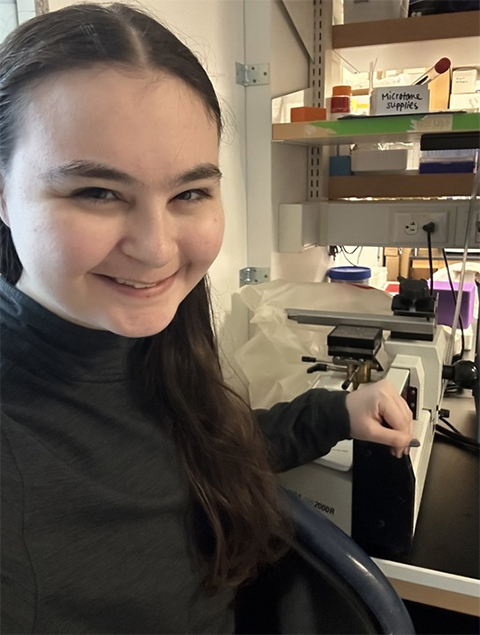Hidden strengths of an autistic scientist
It shouldn’t take you that long just to think of an answer, the faculty judge said.
I was at a loss for words. I was sweating through my cardigan, and I was parched. All I could think about was my autism and whether I was talking normally during my first poster presentation at an undergraduate research symposium.
Did I come across as coherent when talking about my work? Did my face appear enthusiastic or bored? Most of all, did I deserve to be here, or was I just masquerading as a research student?

Since beginning my journey in science, comments like this one have plagued my career. Some professors hurled microaggressions at me in core classes and lab presentations. Others made assumptions about what I could or could not do even before seeing my abilities. One professor even stopped mid-lecture to berate me for not making eye contact while taking notes.
As an autistic rising scientist, small nuances of communication, such as interpreting nonverbal social signals and translating my thoughts into spoken word, are challenging for me. Therefore, it often takes me longer to formulate a response to a question, because I’m trying to emulate normal social conventions and focus on the conversation.
Do you remember how many times you spoke to someone today, such as your lab coworkers or the grocery store cashier? Now imagine you planned — in advance — what you’d say to everyone. During those interactions I constantly interpret facial expressions, force myself to maintain eye contact and strive to ensure a reciprocal exchange of ideas.
Scientific communication is a critical skill for researchers. Because every day social interactions do not come naturally for me, I often feel like an inadequate researcher and communicator. I internalize comments and microaggressions. These leave me feeling like an imposter, questioning whether I can attain a career in science.
Neurodivergence is a spectrum. Even though I struggle with some common tasks, I also bring unique skills to the table, like discerning patterns and making connections between seemingly unrelated ideas.
In my postbaccalaureate research lab, I noticed one of our immunofluorescence experiments produced high background. My lab members thought outdated antibodies caused the problem; however, the issue persisted despite testing two new antibodies.
After further paper reading, I predicted the antibody was not working due to an improper blocking technique. After using a different antibody blocking solution, I eliminated the abnormally high background. My nonlinear thinking allowed us to resolve this problem quickly and see the project to completion.
As a neurodivergent scientist, I understand not everyone will comprehend complex material in the same way. My experiences taught me to diversify my research explanations to ensure the material is accessible to broad audiences. For example, I embed speech-to-text software in my presentations to accommodate hearing impaired individuals and/or those who learn best by reading.
Being a neurodivergent scientist makes me a stronger scientist and more inclusive communicator. Scientists are trained to embrace out-of-the-box thinking and celebrate new ideas. However, many higher education institutions still put up social barriers for those who think and communicate differently. Although I have worked to overcome many of these barriers personally, they still permeate scientific circles. To advance scientific endeavors, we need to make science accessible for everyone, including those who process information differently than the majority.
Enjoy reading ASBMB Today?
Become a member to receive the print edition four times a year and the digital edition monthly.
Learn moreFeatured jobs
from the ASBMB career center
Get the latest from ASBMB Today
Enter your email address, and we’ll send you a weekly email with recent articles, interviews and more.
Latest in People
People highlights or most popular articles

Finding a symphony among complex molecules
MOSAIC scholar Stanna Dorn uses total synthesis to recreate rare bacterial natural products with potential therapeutic applications.

Sketching, scribbling and scicomm
Graduate student Ari Paiz describes how her love of science and art blend to make her an effective science communicator.

Embrace your neurodivergence and flourish in college
This guide offers practical advice on setting yourself up for success — learn how to leverage campus resources, work with professors and embrace your strengths.

Survival tools for a neurodivergent brain in academia
Working in academia is hard, and being neurodivergent makes it harder. Here are a few tools that may help, from a Ph.D. student with ADHD.

Quieting the static: Building inclusive STEM classrooms
Christin Monroe, an assistant professor of chemistry at Landmark College, offers practical tips to help educators make their classrooms more accessible to neurodivergent scientists.

Richard Silverman to speak at ASBMB 2025
Richard Silverman and Melissa Moore are the featured speakers at the ASBMB annual meeting to be held April 12-15 in Chicago.

